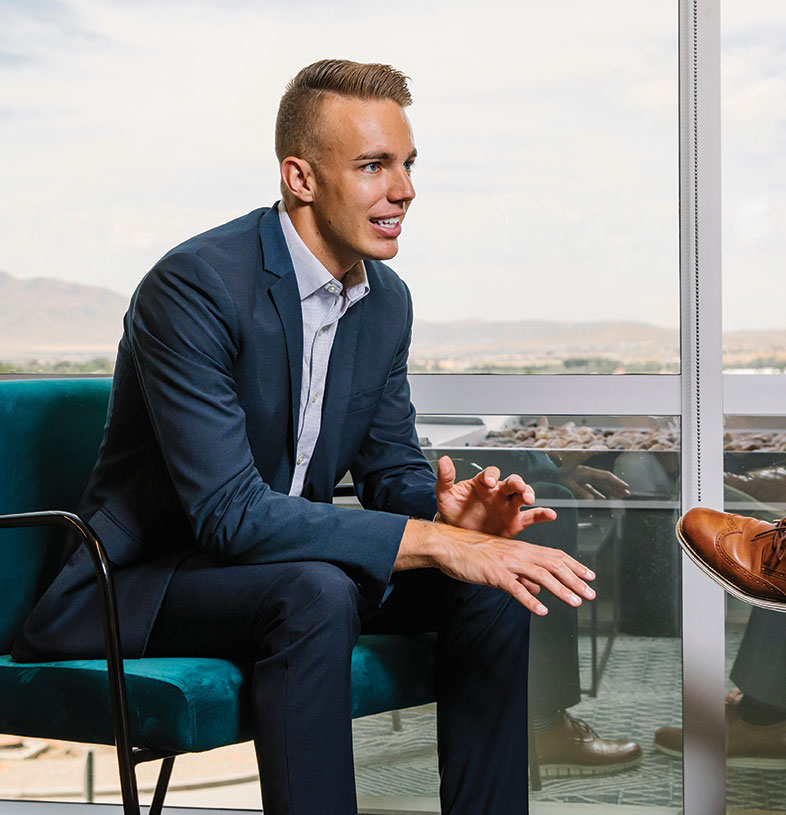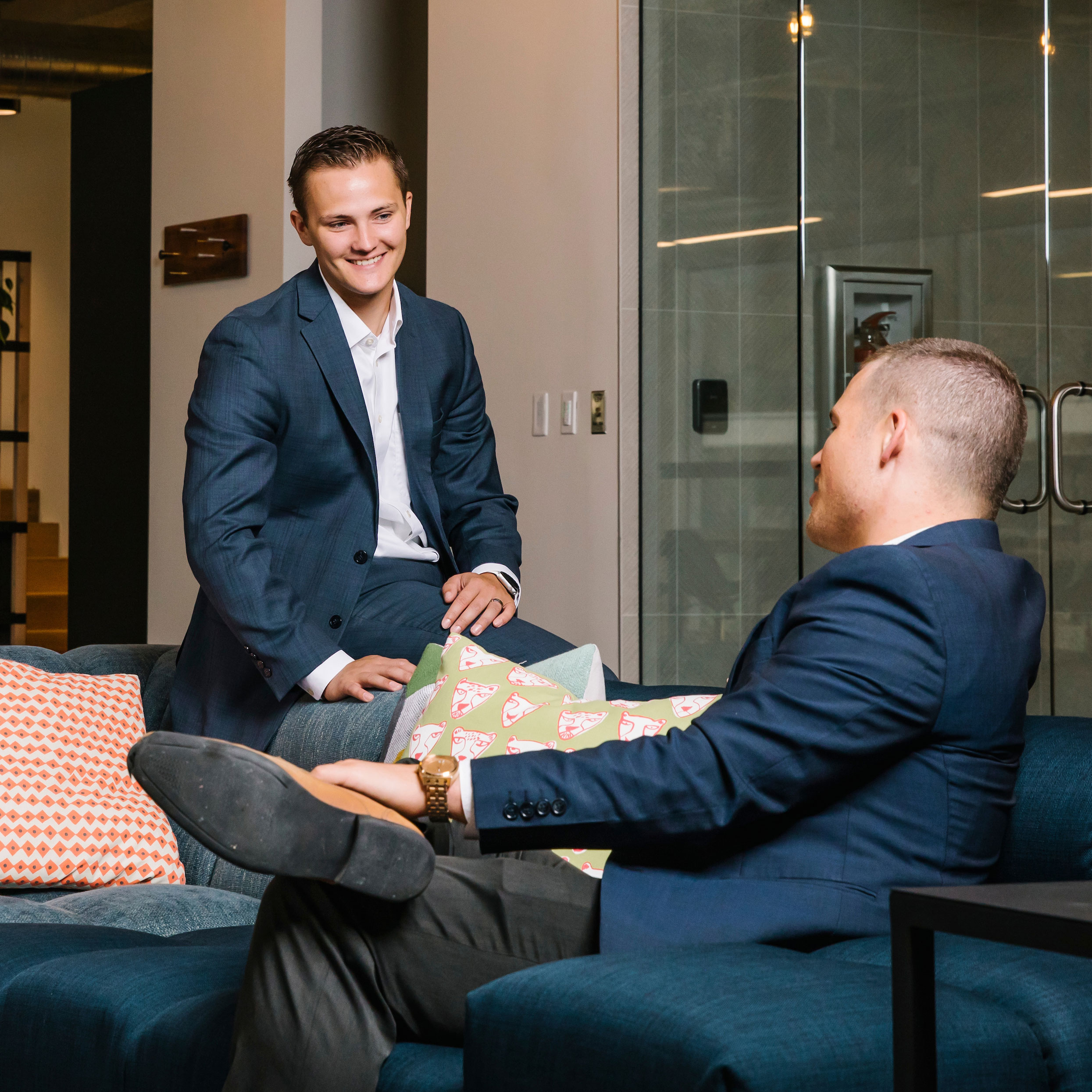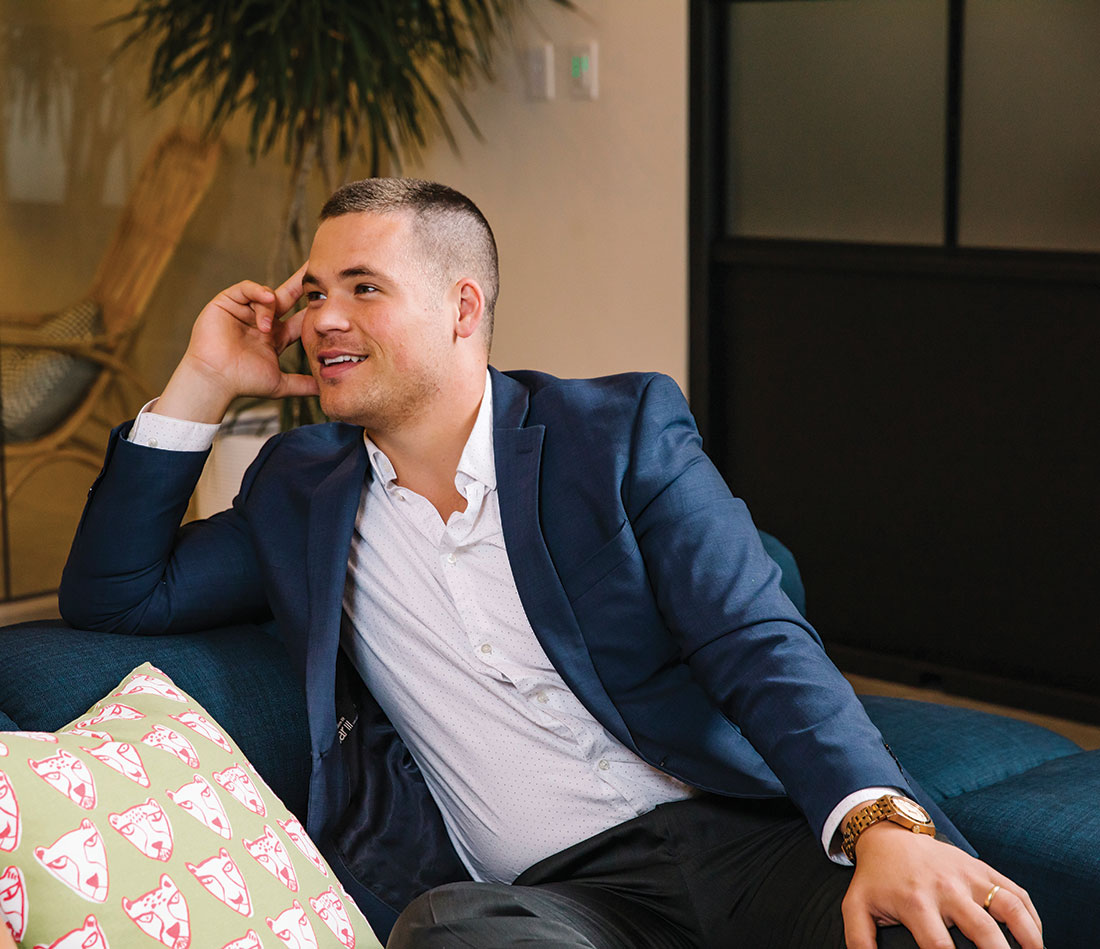
How do you run the “shark tank” if you’re not already a shark? That’s where the Utah Valley University Wolverine Fund comes in.
By Layton Shumway | Photography by Brooke Steinicke

In recent years, the state of Utah has become a hotbed for entrepreneurship and startups. Utah-based companies have received billions of dollars in venture capital over the past 10 years, and, with the growth of Silicon Slopes, that trend is likely to continue. And as venture capital firms seek new investment opportunities, they need employees with experience and confidence in vetting and researching those opportunities.
But how do you get involved in venture capital if you’re not from the Bay Area? How do you gain experience managing billion-dollar investments if you’re a first-generation college student?
In other words: how do you run the “shark tank” if you’re not already a shark?
That’s where the Utah Valley University Wolverine Fund comes in — a student-run venture capital group, managing exclusively donated funds, giving UVU students real-life experience in investing, due diligence, and research.
“These guys are getting as real a venture experience as you're going to get without actually working in venture,” Wolverine Fund Director Jefferson Moss says. “They’re putting all these different skills together and applying them in a very real situation.”


The idea for the Wolverine Fund started with the UVU Foundation, which supports the vision of the university with experience and financial resources.
Under the direction of Board Chair James Clarke, a Foundation task force was created to look for ways to connect with the entrepreneurial ecosystem, while also providing more diversification for the endowment. After looking at several different approaches, the task force came up with the recommendation to launch a student-run venture fund.
But at other universities — most of them at the Ivy League-level — such a fund would likely be restricted to MBA students only. Although a stretch, the Foundation task force wanted to provide opportunities for UVU’s undergraduates to immerse themselves in Utah’s venture capital landscape.
To get the fund off the ground, they needed adjunct professors to help teach the course. Given the real-world nature of the fund, the professors needed to have experience in determining the value of companies, growing businesses, and investing in startup companies. Moss turned to two friends in the Utah startup scene, Bryson Lord and Matt Peterson, to provide initial investments and to help teach classes.

With teachers in place, and initial donations totaling more than $500,000, the next step was to find interested students. Matt Bryson, a UVU business student at the time, made it his mission to find the right group of students to help the fund be successful. It wasn’t easy at first to get students interested.
“It was especially hard to entice students who have no idea what venture capital is,” Bryson says. “A lot of students I talked to come from blue-collar families. A lot of them are first-generation students. They’ve never heard the terms ‘venture capital’ or ‘private equity.’”
The hope was to form a team with diverse experience, not just business students, because performing due diligence in venture capital covers so many bases. Student Brayden Cutler was studying information systems when Bryson approached him.
“I was really intimidated at first,” Cutler says. “Matt tracked me down in the hallway and asked me to join, and I said, ‘I don’t even know what VC is.’”
After joining the team, however, Cutler says he understood how his technology background helped him evaluate startups in that field and ascertain whether their businesses were worth investing in.
“You're assessing the value of the tech and saying, ‘How good is this tech?’” Cutler says. “‘Is it easily replicable? Are there competitive advantages that they've found that other people haven't found? How big is the actual market?’”
Eventually, the initial recruits were whittled down to a group of 10 students who formed the official Wolverine Fund team. From there, they began meeting with startups in the Utah business community, who would come pitch to the class and field questions from the students.
“It was overwhelming at first,” says Kai Schulze, a first-generation UVU student studying finance. “Everything was so new. You can’t understand how much work venture capital takes until you get your hands dirty and do it. It was hard, but nothing in my college career has come close to providing the engaged learning experience that I have had with the Wolverine Fund.”
Nothing in my college career has come close to providing the engaged learning experience that I have had with the Wolverine Fund.
Everyone who saw the students’ preparation came away impressed. “It was a little bit of a risk on our part,” Moss says. “If they would have floundered, we would have lost a lot of credibility with these VCs, who we depend on to give us opportunities to invest alongside them. I heard from every single one of them, ‘Wow, these kids are smart.’”
After conducting research and due diligence, the Wolverine Fund team met with an investment committee made up of experts in the venture capital industry. The team presented their findings and recommended whether or not to invest.
“Basically, the students act as junior analysts at a venture fund,” Peterson says. “And we just grill them. How’d you come up with that number? What about this? Did you consider that? You've got to be on your toes. It really does create some cool bonds between the students and advisors.
“I wasn’t sure what to expect from UVU students,” Peterson adds. “Now that I am here, my respect for UVU students has grown exponentially. These students have the potential to accomplish incredible things.”
What's cool about UVU students is we're very resourceful. We may not know the answer, but we're not prideful enough to say that we know when we don't know, but we're willing to go find out and work for it.
Along with the hands-on experiences and classroom learning, the Wolverine Fund team took part in the Venture Capital Investment Competition (VCIC), where teams of five students from universities across the country act as investors and hear pitches from startup companies.
Getting into the competition was an achievement itself because participation was allowed only by invitation. But when another team was forced to drop out, UVU grabbed the opportunity. The team was placed in the Northeast bracket and defeated Pitt, Michigan, American University, and others to win the regional and qualify for the national finals.
While the UVU team felt intimidated by their inexperience at first, Bryson says their underdog status helped them find innovative solutions and dig in harder.
“What's cool about UVU students is we're very resourceful,” Bryson says. “We may not know the answer, but we're not prideful enough to say that we know it when we don't. We emphatically say we don't know, but we're willing to go find out and work for it.”
While Bryson and five other Wolverine Fund members participated at the national VCIC competition in North Carolina, the rest of the team supported them with research and due diligence. And in the end, the UVU team took second place, defeating larger universities such as Miami, Georgetown, Cornell, and Notre Dame in the process.
“I think there's something cool about that moment where you recognize how hard you worked and to taste that victory,” Carson Rawle, a UVU finance student and a VCIC team member, says. “This experience showed me what our team could accomplish when we work hard and work as a team.”
Moss says the goal of the Wolverine Fund is to be self-sustaining. It follows the traditional venture capital fee model, except that all funds go directly to help students. When donors contribute to the Wolverine Fund, 2% goes to management and operational costs, which includes participating in events like the VCIC. When the investments come to fruition, 20% of the carry (the profit after paying back investors) is placed back into student scholarships, stipends for internships, and funding for UVU’s Entrepreneurial Institute. That helps UVU graduates get a head start on their own businesses and careers, making it possible for them to give back to the Wolverine Fund in the future. Moss says the fund is seeking further donations to bring the total amount from $500,000 to $1 million.
“We see this as a very cool cycle,” Moss says. “If our students do a good job of investing those funds, when those companies have an exit five years from now, a big chunk of that money will go back into future student entrepreneurs, creating more opportunities. We’re hoping that starts to create its own cycle.”
This experience has already given the next cohort of Wolverine Fund associates an advantage on their future careers. “I applied for the fund for the networking and opportunities and was immediately connected with an investment company for an internship,” UVU student Amy Bowman says. “I’ve met numerous influential business owners and investors over the summer, and my time on the fund is only beginning.”
Bryson, who graduated in 2019, has seen his experience as a leg up into his new career. “In my job right now, what I did in the Wolverine Fund, I am literally doing it for work,” Bryson says. “How many times have you heard a student say that? You never hear that. And how rewarding is that? How comfortable does that make me feel? I can say I do know what I'm doing. I did it before, and I was successful at it. So, why can't I be more successful in my future career here? That is incredible, to have that confidence.” ◼

These photos of UVU Wolverine Fund team members were taken at Kiln, a coworking community with locations in Lehi and Salt Lake City. UVU Magazine would like to thank Kiln for the use of their space.
